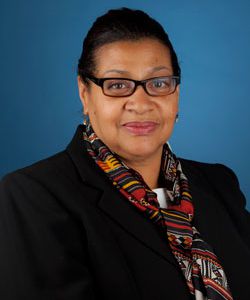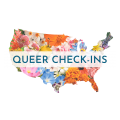Deborah Mack Reimagines the Our Shared Future Initiative
Soliciting a range of voices to address the legacy of systemic racism
Our Shared Future: Reckoning with Our Racial Past is a national initiative that will be comprised of ongoing discussions – often challenging but always authentic – in community-based institutions throughout the United States.
“In this effort, we’re confronting the legacy of racism and how it impacts us every day,” says Deborah L. Mack, PhD, tapped in August by Secretary Lonnie Bunch to lead the Race and Our Shared Future initiative. But the idea is “to be in conversation about honestly reckoning with systemic racism to build a more equitable future together, as opposed to providing prescriptive solutions.” (Click on the link above to view a forum on Race, Health and Wealth hosted by Sabrina Lynn Motley, director of the Smithsonian Folklife Festival, and including an array of other voices.)
Dr. Mack, Associate Director for the Office of Strategic Partnerships at the National African American Museum of History and Culture, previously served as Interim Director of the National Museum of African Art. When the Torch spoke with her in October, she was wrapping up a period of discovery, in which the ROSF team – all detailed from various SI units – sought to imagine “a large and nimble framework that could be virtual [and in-person], that could engage a range of diverse constituents.”
As that phase concludes, a new one is getting underway. “We’re in the midst of course correction now,” she explains. Small working groups inside and outside the SI will be convened to pinpoint particular areas of need/interests around acknowledging, addressing, and taking strategic action to dismantle systemic racism, with pilot projects to follow. “We will be learning as we go,” she says, likening the process to building a ship as it sails across the ocean.
Prior to Secretary Bunch’s call, Dr. Mack admits she was skeptical of the effort, which had initially been handled by an outside consultancy “with no experience dealing with issues of race,” nor any roadmap for tapping into the Smithsonian’s deep expertise around partnerships, education and outreach.
“Many people feel they are invisible in this discussion. That is not just random; that is because of historical oversight.”
“There was a lot good will, but not a lot of experience, and I did not think it would work,” she says. Among other things, “I did not think that the ‘what’ – the central purpose of ROSF – “had been clearly defined.”
Under Dr Mack’s leadership, ROSF’s central tenet of developing opportunities to discuss race and confront racism is coming into sharper focus.
“What we are grappling with right now is that many communities feel they are being talked to and talked at, partly because of how the media has approached issues of race,” she says. “There are people and communities who feel they are ‘the bad guys,’ and others who are portrayed as victims.”
“Many people feel they are invisible in this discussion,” Dr. Mack continues. “That’s not just random; that is because of historical oversight.”
In any format, ROSF-driven discussion must take into consideration that “many of the issues are defined in different ways by different communities” far from the “bubble” of DC, she says. In this effort, “we plan with [a broad range of constituencies] and not for.”
Dr Mack notes her history of work at “numerous contested sites” is helpful in trying to ensure ROSF is gathering input from myriad groups. “Once people feel that you hear them and see them, they will often work with you. It doesn’t mean you get your way, but there is an openness to welcoming a range of different approaches and diverse perspectives.”
Since joining SI in 2012, Dr. Mack has been responsible for overall planning, management and coordination of professional partnership programs and international activities. Prior to that, she’d been a consultant focused on African American museum scholarship and a scholar examining slavery and segregation. The relationships forged in that period of her career informed her work at NMAAHC.
In a sense, steering ROSF is a variant of the effort she contributed to in the development of NAAMHC’s mission, writ large. “Lonnie [Bunch] was very supportive of [that] approach,” she says. “He gave us a lot of encouragement in efforts to raise the profile of the African American museum field.” Now the task is to open even broader lines of dialogue by harnessing the SI’s “convening power, high caliber of resources and strong relationships with partner organizations around the country.”
SI educators, curators, researchers and other staff are ideally placed to advance this work. “I am discovering incredibly talented colleagues, resources and programs [across SI] that I did not know existed,” she adds.
“SI cannot fix the race problem of race in this country, let’s just be honest here,” Dr. Mack concludes. “But we can facilitate discussion and support organizations that do this ongoing work every day,” as well as lay the groundwork upon which subsequent generations of leaders can carry the dialogue forward.

Dr. Mack has a long history with the Smithsonian, having served on the advisory Smithsonian Council from 1999 – 2005 and from 2005-2011 on the NMAAHC Scholarly Advisory Committee. In addition, she has extensive experience as a consultant, advising on museum organizational and strategic planning, on interpretive and exhibition development, and on cultural and heritage tourism with organizations nationwide and internationally.
Dr. Mack holds both doctoral and master’s degrees in anthropology from Northwestern University. Her bachelor’s degree in geography is from the University of Chicago. She currently serves as peer reviewer for the National Endowment for the Arts, National Endowment for the Humanities, the Institute of Museum and Library Services, and the National Trust for Historic Places.
Read more from Dr. Mack
Mack, Deborah L and Welch, John S. (Eds.). 2018. State of Black Museums: Historiography Commemorating the Founding and Existence of Black Museums Over Four Decades. [Special issue]. The Public Historian. 40 (3). “The State of Black Museums” 40 (3): 9–12. https://doi.org/10.1525/tph.2018.40.3.9
Thiaw, Ibrahima and Mack, Deborah L (Eds). October 2020.”Atlantic Slavery and the Making of the Modern World: Experiences, Representations, and Legacies”. Current Anthropology,Supplement 22. https://www.journals.uchicago.edu/pb-assets/docs/journals/CAv61nS22-1610652602440.pdf.
Posted: 15 December 2021







